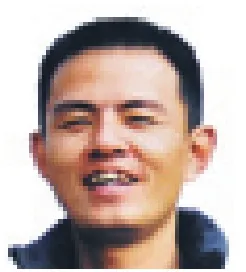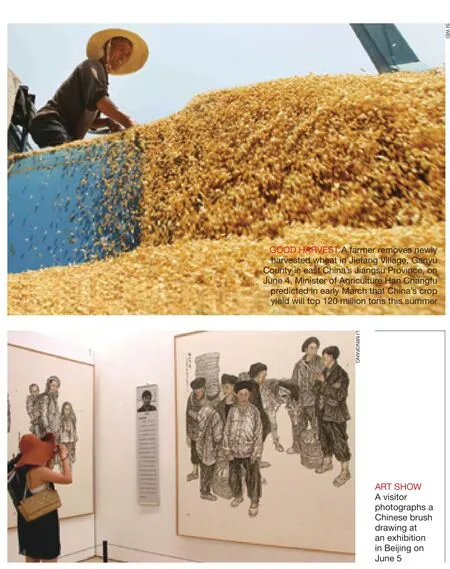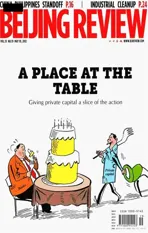THIS WEEK
2012-10-14
THIS WEEK
“Chinese government ships have left the lagoon but remain in waters of the Huangyan Island to provide services to the Chinese fishermen there.”
Chinese Foreign Ministry Spokesman Liu Weimin, in response to a report saying that China and the Philippines have both agreed to withdraw their ships from a lagoon in the area of the Huangyan Island at a press conference in Beijing on June 6
“We are not doing any work in relation to any financial support.”
IMF Chief Christine Lagarde, saying the IMF was not planning any financial assistance to Spain, in Washington, D.C. on May 31
“By not using the dollar as an intermediate currency, we can lower transaction costs and reduce settlement risks at financial institutions as well as making both nations’ currencies more useful and energizing the Tokyo market.”
Japanese Finance Minister Jun Azumi, praising direct yuan-yen trading during an interview with Xinhua News Agency on June 6
“People-to-people exchanges form a significant foundation to boost the China-U.S. cooperation, and also an important part of establishing a new type of relationship between China and the United States.”
Chinese Vice President Xi Jinping, during a meeting with a U.S. good-will delegation headed by the Governor of Iowa Terry Branstad in Beijing on June 3
“The Chinese and Russian economies have different strengths and complement each other. China and Russia should further promote strategic large-scale projects cooperation in natural gas, nuclear energy, aviation and other fields.”
Vice Premier Li Keqiang, making the remarks while meeting with Russian President Vladimir Putin in Beijing on June 6

Sustainable Development
China released a report on sustainable development on June 1, ahead of the UN Conference on Sustainable Development to be held in Rio de Janeiro, Brazil, on June 20-22.
The report focuses on the efforts and progress China has made since 2001 in implementing sustainable development strategies. It also analyzes existing gaps and challenges, puts forward future strategic initiatives, and clarifies China’s positions for the upcoming conference.
From 2000 to 2010, the number of Chinese people living below the poverty line decreased from 94.22 million to 26.88 million, with the poverty rate dropping from 10.2 percent to 2.8 percent, according to poverty relief standards that have since been revised.
Meanwhile, China has managed to raise energy efficiency year by year in major energy-consuming industries. Compared with 2005, the energy consumption per unit of industrial added-value had a cumulative decline of 26 percent by 2010.
While outlining China’s progress in promoting sustainable development, the report also acknowledges a range of challenges ahead.
China’s per-capita GDP ranks 100th in the world and there are still 122 million people living in poverty according to the updated standard.
Moreover, given the severe resources and environmental constraints on economic development, pronounced unevenness in development among regions, and weak scientific and technological innovation capacities, China still faces an arduous task of improving people’s livelihood, the report says.
Flexible Pension System
The Ministry of Human Resources and Social Security said in a written statement posted on its website on June 6 that it is conducting research into a more flexible retirement and pension system to keep a balance between employment and an expected shortfall in retirement payments in China. But it did not clarify detailed plans.
In China most men retire at 60 and women at 55. Almost all employees in China, in both private and state-owned organizations, have an individual pension account, to which both employee and employer have to make a monthly contribution. The employee cannot withdraw any funds until he or she retires.
However, the country is facing a ballooning deficit in its retirement pension funds due to an aging population. For example, in line with the current contribution ratio, the pension funds only pay women about 40 percent of their working wage monthly for 15 years after retirement.
Heroic Driver
Government officials have honored a bus driver who saved the lives of 24 passengers after being mortally wounded by a flying piece of metal.
Wu Bin, the 48-year-old driver, was traveling from east China’s Jiangsu Province to Zhejiang Provine on May 29 when the accident occurred. He was struck in the chest by a large metal fragment that flew through the bus’s windshield. Video from the bus showed Wu slowed the bus to a stop, turned on the hazard lights, put on the parking break, opened the door of the bus and asked passengers to evacuate. He died three days later.
Wu was honored with the title martyr by the Zhejiang Provincial Government and model worker by the Ministry of Transport. People took to the Internet to show their respect for Wu, praising his courage and urging authorities to investigate the accident and take care of Wu’s family. Wu’s family declined to accept donations that poured in after Wu’s story was widely reported in China.

Transparent Charity
Volunteers, donors, Internet users and reporters were invited to visit the Red Cross Society of China (RCSC) on June 6, and were briefed on the organization’s recent work.

GaRBaGE SORTinG Residents in Dalian City, northeast China’s Liaoning Province, learn how to sort garbage on June 5,World Environment Day
The move is one of the organization’s efforts to boost transparency in the charity system and dispel public concerns over the possible misuse of donations.
Zhao Baige, Executive Vice President of the RCSC, said that the organization would set up a public supervision committee and invite credible public figures to participate in and supervise the organization’s major charity projects.
An internal monitoring organ and an accountability mechanism would also be established to ensure that donations are used properly, Zhao said.

The RCSC came under fire last year after a woman calling herself Guo Meimei posted pictures on her micro-blog detailing her lavish lifestyle. She, falsely, claimed to be general manager of “Red Cross Commerce,” a group that the RCSC said does not exist.
Mental Health
The Ministry of Health (MOH) plans to establish a treatment network for serious mental diseases that will cover at least 95 percent of counties and cities nationwide by 2015.
According to a draft guideline on the country’s mental health work for 2012-15, released by MOH on June 6 for public feedback, China has 16 million people suffering from schizophrenia and other severe mental diseases, but services and treatment facilities for them are inadequate.
Serious mental illnesses mainly include schizophrenia, schizoaffective disorder, bipolar disorder and mental retardation. People suffering from such disorders may find it difficult to control their behavior and may become a threat to others and public security, according to the ministry.
The guideline looks to ensure formal supervision of 70 percent of patients diagnosed with severe mental diseases while 60 percent are targeted to receive regular treatment by 2015.
In addition, the draft sets the goal to equip 90 percent of community health service centers with personnel specializing in mental illness treatment by 2015. Psychological crisis intervention teams will be set up in at least 90 percent of provincial-level regions and 60 percent of cities.
The guideline also urges mental consultation and education services for enterprises, elderly groups and other social organizations.
Asian Beach Games
Haiyang City in east China’s Shandong Province will host the Third Asian Beach Games on June 16-22.
The games will feature 49 events in 13 sports, including beach soccer, cliff climbing, windsurfing, powered paragliding, beach volleyball and beach basketball.
Great Wall Survey
China’s existing Great Wall, one of the country’s signature relics, is 21,196.18 km long, according to the latest survey released by the State Administration of Cultural Heritage (SACH) on June 5.
An archeological survey jointly conducted by the SACH and the former State Bureau of Surveying and Mapping since 2007 found that the Great Wall structures span the country’s 15 provinces, autonomous regions and municipalities.
A total of 43,721 heritage sites were identified nationwide during the survey, including stretches of the wall, defense works and passes, as well as other related Great Wall facilities and ruins.
This was the first time such a figure had been released, as a preliminary survey in 2008 only showed that the Great Wall structures built during the Ming Dynasty (1368-1644) extended more than 8,850 km.
Construction of the first Great Wall dated back to the Warring States Period (475-221 B.C.) and, over subsequent centuries, walls were built by later dynasties in scattered, but strategic areas to fend off northern nomadic tribes. It was put on the UN Educational, Scientific and Cultural Organization’s list of world heritage sites in 1987.
Interest Rates Cut
China’s central bank cut interest rates for deposits and loans by a quarter of a percentage point on June 8.
It was the first time that the People’s Bank of China cut the benchmark rates since December 2008, after which it raised the rates five times to drain liquidity.
After the cut, the one-year deposit interest rate fell to 3.25 percent while that of the oneyear loan interest rate was lowered to 6.31 percent.
The upper limit of the floating band of deposit rates will be adjusted to 1.1 times the benchmark level while banks are allowed to offer 20-percent discount to borrowers.
The latest move came as China’s slowerthan-expected economic growth had raised concerns over an abrupt brake for the world’s second largest economy.
China’s GDP growth slowed to a nearly three-year low of 8.1 percent in the first quarter as key economic indicators for April continue to suggest downward risks.
Manufacturing Slows
The purchasing managers index (PMI), a readout of the country’s manufacturing activity, ended five consecutive months of growth in May and retreated to 50.4 percent from 53.3 percent in April, the China Federation of Logistics and Purchasing (CFLP) said on June 1.
The figures for May showed that although China’s economy decelerated, the overall growth trend remained unchanged, as the reading still stood above 50 percent, said the CFLP. A PMI reading of 50 percent demarcates expansion from contraction.
The sub-index for new orders dipped below 50 percent, to 49.8 percent in May, indicating shrinking demand in the manufacturing sector.
The world’s second largest economy is likely to further lose steam with a decline in the sub-index for new orders, pointing to even weaker future factory activity, according to Zhang Liqun, a researcher from the Development Research Center of the State Council.
Zhang noted that the economic downshift will be mitigated by government efforts to maintain growth, especially policies aimed at stabilizing investment.
Boosting Rural Consumption
The Ministry of Commerce said on June 5 that home appliance sales under the country’s rural subsidy program surged 72.6 percent year on year to 18.28 billion yuan ($2.9 billion) in May.
In the first five months, home appliance sales in the countryside rose 4.4 percent from a year earlier to reach 79.88 billion yuan ($12.68 billion). The volume of appliances sold in the period dropped 5.7 percent to 30.11 million units.
At the end of May, China had subsidized 248 million units of home appliances valued at 585.8 billion yuan ($92.98 billion) since the subsidy program began.
Initiated in 2009 to stimulate rural consumption and buoy the nation’s economic growth amid the global economic downturn, the subsidy program will continue tillJanuary 2013.

NECTA BANQUET a visitor examines a bottle of wine at the Topwine China 2012 held in Beijing on June 4-7
Under the program, farmers can receive subsidies equal to 13 percent of the price of the home appliances they buy.
Auto Tax Reduction
China has announced a second wave of tax cuts for clean-energy cars, specifying 64 new energy-saving vehicles covered by the scheme.
The government has decided to halve vehicle taxes for buyers in these cases, in a bid to boost slow sales of green cars in the country. The fees for users of seven types of electric automobiles will be removed, according to a document jointly released by the Ministry of Finance, the Ministry of Industry and Information Technology, and the State Administration of Taxation on June 5.
At least 10 domestic auto producers were included in the list specified by the new policy, which took effect on January 1. Consumers who have bought the vehicles will get tax refunds.
The government first applied the policy in March, listing a first batch of eligible cars. At least 200 types of plug-in hybrid cars, pure electric cars and fuel cell vehicles were included.
SOE Breach
The Industrial and Commercial Bank of China (ICBC) and Citic Group Corp. violated several financial regulations in their lending and other operations, the National Audit Office (NAO) ruled on June 1.
NAO’s routine audit of the two companies’ activities in 2010 found they had broken rules on providing credit services, including granting loans to under-funded property projects and local government financing platforms, as well as providing bill discounting services to falsified trade contracts.
The audit office said the two companies had chaotic financial management, adding that some of their loans were misused by their clients.
Separately, the NAO also audited the financial revenues of 15 centrally administered state-owned enterprises (SOEs), including the country’s two oil giants—China National Petroleum Corp. and China Petrochemical Corp.
It said various irregularities were uncovered in these companies, but that 97 percent of these violations had been rectified and that 87 people responsible had been penalized as of the end of March.

KunMinG FaiR A businessman from Nepal shows a handmade clothpainting at the 2012 China Kunming import and Export Fair held on June 6-10 in Kunming, capital of southwest China’s Yunnan Province
Senior Diplomat
Wu Hongbo, a senior Chinese diplomat and China’s ambassador to Germany, was appointed under-secretary-general to lead the Department of Economic and Social Affairs (DESA) by UN Secretary General Ban Ki-moon, a UN spokesman announced on May 31. The 60-year-old diplomat is set to take over the position held by another Chinese official, Sha Zukang, since February 2007.
“Wu has over 30 years of high-level experience, including close collaboration at international conferences and with multilateral organizations,” said Ban in a statement posted on the UN’s official website. The statement noted Wu’s role in helping China implement UN conventions on the environment and development as well as its report on progress toward the Millennium Development Goals.
Wu, born in east China’s Shandong Province, graduated from Beijing Foreign Studies University and pursued graduate studies at Victoria University in New Zealand from 1978 to 1980. He has served as assistant foreign minister since 2007. In August 2009, Wu was appointed China’s ambassador to Germany.


Britain’s Queen Elizabeth II and members of the royal family attend a ceremony at St Paul’s Cathedral in London on June 5 to celebrate the Diamond Jubilee, which marks 60 years of the queen’s reign
BRITAIN

Electoral workers open ballot boxes as they count votes in a fiscal treaty referendum in Dublin on June 1. Irish voters backed the EU fiscal pact designed to shore up the turmoil-hit euro zone by a large majority
IRELAND


